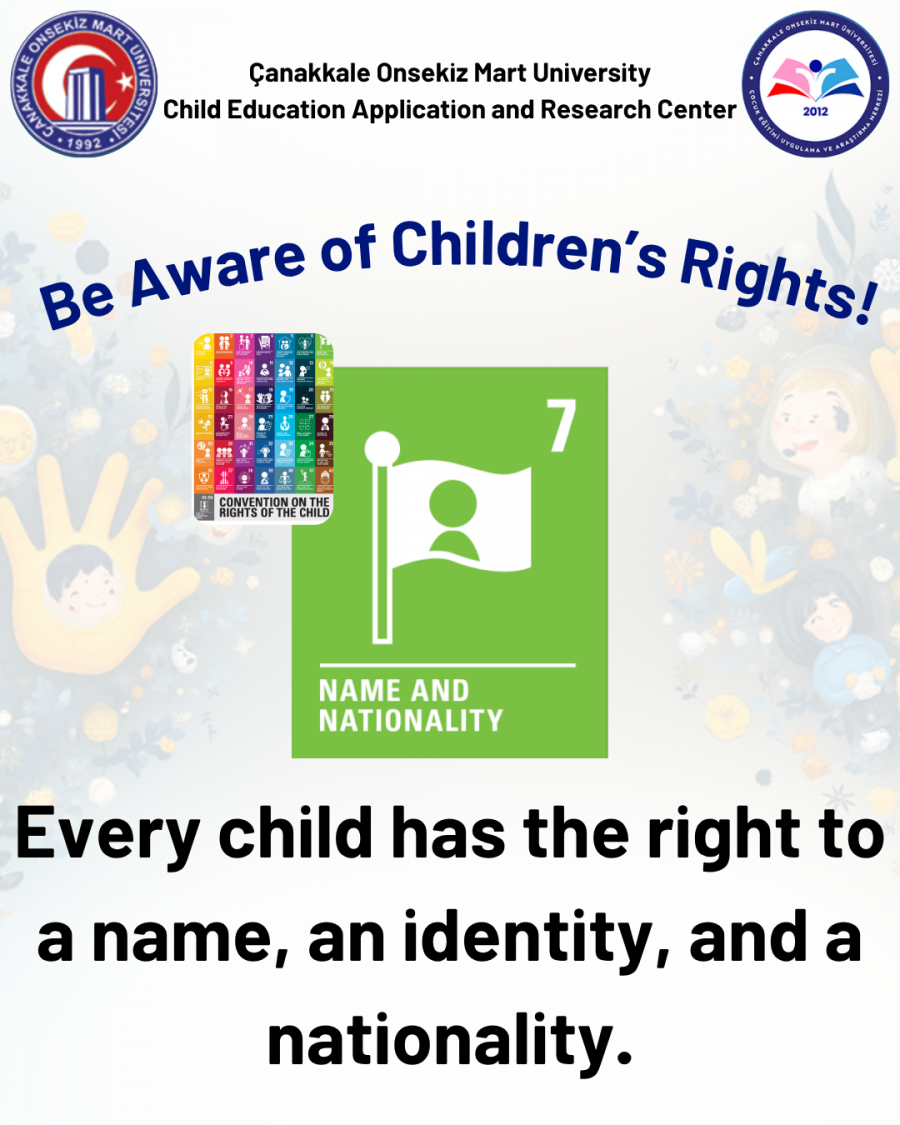


Article 7 of the United Nations Convention on the Rights of the Child guarantees every child’s right to a name, nationality, and identity from birth. The article also affirms the child’s right, to the extent possible, to know and be cared for by their parents. These rights form the foundation not only for the child’s recognition as an individual but also for their access to all other rights throughout life.
Birth registration immediately after birth ensures the official recognition of a child’s existence. Children whose identities are not recorded often become invisible within state systems and face significant barriers in accessing education, healthcare, social protection, and other fundamental rights. As Ronen (2004) notes, a child without a birth certificate may be considered “legally non-existent,” placing them at risk of social exclusion from early childhood onward. Doek (2006) similarly emphasizes that unregistered children may be treated as adults in criminal proceedings, denied access to social services, and exposed to exploitation.
Today, millions of children around the world still live without birth registration. This issue is prevalent in impoverished regions, rural communities, conflict-affected areas, and countries experiencing large-scale migration. Bhabha (2009) shows that migrant mothers often face obstacles such as language barriers, the cost of documentation, and concerns about legal status, all of which contribute to their children remaining undocumented. Children without legal status face severe barriers to citizenship, education, healthcare, and social protection.
Statelessness is one of the most critical challenges addressed under Article 7. Children without nationality are excluded from state protection and face lifelong obstacles. Paleker et al. (2023) report that stateless children have limited access to education, struggle to secure employment and healthcare in adulthood, and encounter structural discrimination. Findings by Fernandez et al. (2025) also show that nationality is essential for social inclusion and participation. In many countries, gender-discriminatory citizenship laws, particularly when a child’s father is unknown or unrecognized, lead to statelessness. Dake and Fuseini (2018) and Purwatiningsih et al. (2025) demonstrate that home births in rural areas, long distances to registration offices, and bureaucratic obstacles continue to prevent families from obtaining birth certificates. Combined with restrictive legal policies, these barriers deepen cycles of rights violations.
The right to a name is another essential dimension of Article 7. A child’s name is an integral part of their cultural identity and personal dignity. In some contexts, naming practices are discriminatory: names associated with particular ethnic groups are rejected, or children receive derogatory labels on official documents. Rahbari (2022) argues that patriarchal norms and exclusionary naming practices continue to influence how children are named, shaping their identity formation over time.
Article 7 also ensures the child’s right, as far as possible, to know and benefit from the care of their parents. However, this right must be interpreted within the framework of the child’s best interests. Advances in reproductive technologies, adoption, and surrogacy have made issues related to parentage more complex. Nevertheless, children’s access to basic medical information about their biological origins is considered an integral aspect of their right to health (Dhiman & Harbers, 2023).
Article 7 places a clear responsibility on governments to ensure that birth registration is free, accessible, and non-discriminatory. Mobile registration units in rural areas, collaboration with health facilities, and the removal of unnecessary documentation requirements, such as marriage certificates, are essential steps toward universal registration. Furthermore, lack of a birth certificate must never be used as a reason to deny children access to education, healthcare, or social services.
In conclusion, the rights to a name, identity, and nationality are among the most fundamental guarantees a child has at the start of life. These rights ensure that every child is visible, protected, and recognised as an equal member of society. Article 7 not only safeguards a child’s birth but also ensures their recognition and inclusion in every aspect of social life. Every child deserves to have an identity from the moment they are born and to take their place in the world with dignity.
References
Bhabha, J. (2009). Arendt’s children: Do today’s migrant children have a right to have rights? Human Rights Quarterly, 31(2), 410–451. https://doi.org/10.1353/hrq.0.0072
Dake, F. A., & Fuseini, K. (2018). Registered or unregistered? Levels and differentials in registration and certification of births in Ghana. BMC international health and human rights, 18(1), 25. https://doi.org/10.1186/s12914-018-0163-5
Dhiman, A., & Harbers, I. (2023). Legal identity at the margins: the impact of violent conflict on birth registration in India, Citizenship Studies, 27:7, 779-798. https://doi.org/10.1080/13621025.2024.2321714
Doek, J. E. (2006). The CRC and the Right to Acquire and to Preserve a Nationality. Refugee Survey Quarterly, 25(3), 26-32. https://doi.org/10.1093/rsq/hdi0143
Fernandez, B., McGee, T., Albarazi, Z., Brennan, D., & Block, K. (2025). At risk of statelessness: Children born in Lebanon to migrant domestic workers. International Migration Review, 59(1), 502-528. https://doi.org/10.1177/01979183231186794
Paleker, M., Boggs, D., Jackson, D., Day, L.-T., & Lawn, J. E. (2023). Closing the birth registration gap for Every newborn facility birth: literature review and qualitative research, Global Health Action, 16:1, 2286073. https://doi.org/10.1080/16549716.2023.2286073
Purwatiningsih, Y., Faisal, D. R., Masitoh, S., Lestyoningrum, S. D., Warouw, T. S., Sulistiyowati, N., ... & Afifah, T. (2025). Determinants of Unregistered Births Among Children Under Five in Indonesia. Journal of Population and Social Studies [JPSS], 33, 669-683. http://doi.org/10.25133/JPSSv332025.036
Rahbari, L. (2022). Marriage, parentage and child registration in Iran: legal status of children of unmarried parents. Social Sciences, 11(3), 120. https://doi.org/10.3390/socsci11030120
Dr. Sezen ÇİÇEK APAYDIN
November 13, 2025